The 35th APAY Advanced Studies Program
Last Updated (Tuesday, 11 July 2017 14:38)
The 35th Advanced Studies Program of APAY will be held during 3 – 28 November 2017 at the YMCA Youth Village, Wu Kwai Sha, Ma On Shan, New Territories, Hong Kong.
Initiated in the year 1982, this training is held each year, as an advanced training program for the senior professional secretaries of the YMCAs of our region. The candidates should be a university graduate and have at least 3 years work experience in the YMCA’s core administration, at policy making level.
The main objectives of this month-long training is to enhance YMCA professional secretaries’ ability to critically analyze ongoing social processes, based on the life and teachings of Jesus Christ and develop the YMCA professionals who are mission-responsive, socially relevant and effective institutional leaders.
We urge the YMCA national movements of our region to nominate suitable YMCA professionals for the program. Detailed information and registration form of this course has already been dispatched to the national movements.
Limited amount of subsidies are available only for deserving candidates for air travel and participation fee. The registration fee and the green fee are mandatory for all participants. Subsidy requests should be sent along with the applications forms.
Applications with required documents should reach APAY on or before 31 July 2017 and successful candidates shall be notified on or before 15 August 2017 by APAY.
If you have any queries or need any clarifications please feel free to contact Mr. Duncan Chowdhury, our Executive Secretary for Programs at This e-mail address is being protected from spambots. You need JavaScript enabled to view it for this purpose.
35th Advanced Studies Programme
3– 28 November 2017
(Day of arrival 2 Nov and Day of Departure 29 Nov)
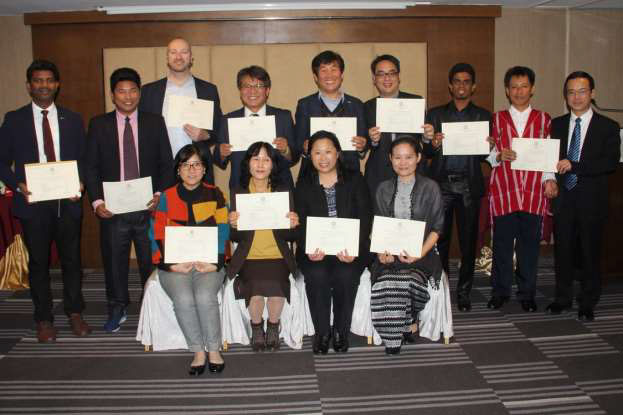
Asia and Pacific Alliance of YMCAs
23 Waterloo Road, 6th Floor, Kowloon, Hong Kong SAR
Tel. 852-27808347, 2770 3168, 2783 3058; Fax.852- 23854692
e-mail :
This e-mail address is being protected from spambots. You need JavaScript enabled to view it
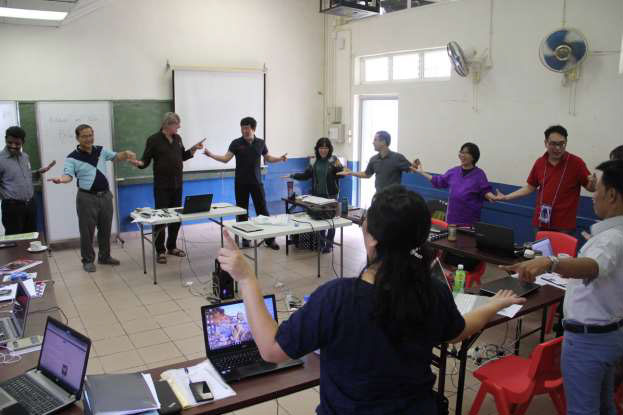
Curriculum for YMCA Advanced Studies Programme
INTRODUCTION
Asian and Pacific societies continue to manifest its diversity - economically, politically socially and culturally. People and communities are forced to make adjustments based on the many transitions that the region is experiencing. A diverse range of vulnerable and marginalized groups are trapped in economic vicious cycle, by following prescribed directions set by the world economic bodies in the name of structural adjustment. Globalization penetrates the lives of the local people. Poverty and economic injustice are on the rise. The culture of materialism threatens our lifestyles. There is a rise in social and security risks for all, particularly in urbanized societies. There is disregard for the environment and integrity of creation. We are afflicted by poverty, gender discrimination, racial discrimination, culture of violence, ethnic and religious conflicts and war. Religious fundamentalism is on the rise. Young people are subject to disempowerment.
The diversity and complexity of the Asian and Pacific context call for a YMCA leadership, rooted in our founding philosophy and spirituality to transform lives and to empower individuals and communities. It is a leadership that takes cognizance of the realities of the day and responds in love to bring justice and peace, to build harmonious societies. Its leadership values are applied both within the YMCA movement and the society at large.
The Advanced Studies emphasizes the formation of YMCA professional leaders for strengthening and growth of the YMCA. It is essential that YMCA leaders be rooted, grounded and clear in the Mission we have been entrusted with in order to act relevantly within the social realities or our context. These would need to be supported by a viable and self-sufficient institution base and that is why we need to be more involved in Movement Strengthening. The sustainability of our organization lies in our effort to strengthen it, in terms of resources and responsive to the needs of community. Thus the YMCA could be made indispensable in the society. YMCA being a youth movement, we need to focus on youth more than before, involve more youth in the YMCA, address to their problems through our programs.
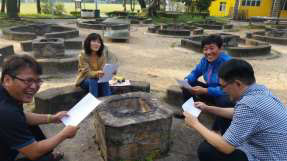
To fulfill the challenges of developing leadership for YMCAs in today’s context and for transformation, the Studies will provide platforms to discover roles and responsibilities of the YMCA as a people’s movement committed to working for justice and peace, according to the life and teachings of Jesus Christ.
The Advanced Studies Program is one of the flagship programs of APAY, this was launched in the year 1982, since then APAY has successfully completed 34 batches of Advanced Studies Program throughout these years. The exception was the year 1983 when the Advanced Studies Program could not be held.
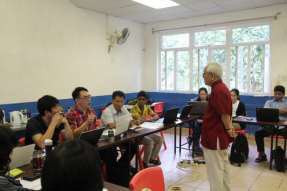
With the completion of the 34th Advanced Studies Program in 2016, now the total number of YMCA professionals, who have successfully completed this program stands at 437. Most of the graduates are YMCA professionals are from various YMCA movements of our region of Asia and Pacific. This also includes 19 YMCA professionals participating from Africa and 17 from Latin America and the Caribbean.
MAIN COMPONENTS
The main thematic concepts and knowledge components of the Advanced Studies are:
• Study of Contextual Theology & YMCA Mission
• Social Realities & Analysis
• Contemporary Social Issues & Alternative Responses
• Governance in the YMCA
In order to strengthen our internalization of the spiritual basis of the YMCA Movement and in interpreting the Mission of the YMCA in the prevailing situations, the theological basis of the YMCA will be thoroughly explored. Efforts will be made to explore ways and means of strengthening the movement dimension of the YMCA and how it can actively participate in building sustainable community and fostering civil society. Study will thus be made of the YMCA’s search for identity and mission relevance in the history of the YMCA in our region. There will a focus to understand and strengthen the YMCA in terms of governance structure, its practices towards self-sufficiency e.g. Lay & Professional Development, Movement Strengthening, Strategic Planning Process and Good Governance in the YMCA.
Efforts will be made to understand the contemporary socio-economic, cultural and political realities, the global socio-political and economic process (globalization) and its implications at the national, regional and global levels. In-depth study will also be made of Community and Social Movements in an effort to envision new alternatives and relevant responses like Global Citizenship Education, Peace Building & Conflict Resolution, Alternative Tourism, Social Economy & Gender Mainstreaming.
The participants will have the opportunity to be familiar with the present day issues like Gender Mainstreaming, Economic Justice, Just Peace and contemplate to incorporate these into the YMCA program pattern.
Movement Strengthening will also be dealt in the program in order to equip the participants to make their YMCA a viable and sustainable movement. Participants shall be encouraged to adhere to the principles of good governance to enable their YMCAs to operate with accountability and transparency.
Finally, each participant will present and share their Contextual Programme Response (Work-Plan) that they could implement upon return to their YMCAs. The entire group will have the opportunity to critique the relevant YMCA responses/plans related to her/his own contexts and thrust of the Advanced Studies.
OBJECTIVES
The Advanced Studies Programme as a programme of intensive studies aims to:
1. Enhance YMCA professional secretaries’ ability to critically analyze ongoing social processes and based on the life and teachings of Jesus Christ, to be leaders in relevant actions to fulfill the Mission of the YMCA.
2. Develop YMCA professionals who are mission-responsive, socially relevant and effective institutional leaders.
SPECIFIC PURPOSES
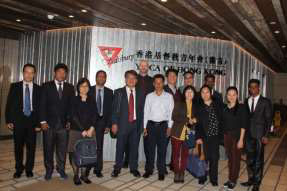
1. To encourage participants to reflect critically on their own experiences in context of the social realities in their communities, areas of service, work-situations, and countries.
2. To enhance participants’ understanding of current Christian Mission.
3. To inculcate in YMCA professional leaders a deep perspective of the YMCA’s Mission and to search for appropriate and innovative responses, especially relating to people’s search for justice and peace, sensitive to the economic, political, and socio-cultural situations of communities/societies where the YMCA works.
4. To explore trends of effective leadership and governance for enhanced contextual mission clarity and response.
5. To provide opportunities for participants to build relationships and enhance solidarity with colleagues from different YMCAs in the region and beyond.
CRITERIA/QUALIFICATIONS OF CANDIDATES
The YMCA Advanced Studies Programme is a demanding programme. It is participatory in nature. The success of the programme depends on active involvement of all participants. Therefore, the sending YMCA should ensure the participants possess the core competencies expected of a professional/executive in the YMCA.
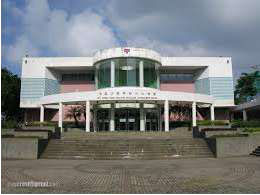
a. Participants should be attitudinally inclined to the thrust of the YMCA and Advanced Studies.
b. Participants should be critically responsive and committed to the mission of the YMCA and should have working experience in community-oriented programs
c. Participants should be from the professional or executive levels with at least three-years’ successful working experience in the YMCA and/or other Ecumenical organizations, and be under 40 years.
d. Participants should have completed Basic YMCA Secretaries’ Training at national level or should have undergone any equivalent leadership training. It is understood aken that the basic qualification to enter National YMCA Training (Institute) is a university degree or its equivalent.
COMPONENTS OF THE ADVANCED STUDIES
Module 1: Orientation and Building Community
a. Orientation to Campus and Ma On Shan Township
b. Overview of Components of Advanced Studies
c. Expectations of Participants
d. Sharing of “Life-Moments”
e. Creative Devotion
Orientation and Expectations
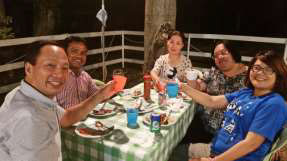 The Participants of an Advanced Studies Programme (ASP) probably would not have known each other before, coming from different countries in the region and other parts of the world. The ASP offers an excellent opportunity of establishing close friendship with each other and of creating strong solidarity links as colleagues working for the mission of the YMCA.
The Participants of an Advanced Studies Programme (ASP) probably would not have known each other before, coming from different countries in the region and other parts of the world. The ASP offers an excellent opportunity of establishing close friendship with each other and of creating strong solidarity links as colleagues working for the mission of the YMCA.
The venue of the Advanced Studies is the Youth Village at Ma On Shan, New Territories, Hong Kong. It is a beautiful campsite of Chinese YMCA of Hong Kong, equipped with modern facilities. Participants will be housed in well-equipped 4 twin-roomed cottages. Located about 30 kilometers outside the bustling city of Kowloon, the Wu Kwai Sha environment is ideal for study and reflection.
The Advanced Studies as a sharing-learning community journey begins with an overview of the different components of the programme and how they are interlinked. To level off, participants will express their Expectations of the Studies.
As a natural way of building a sharing-learning community, the sharing of “Life-Moments” will begin the process of community bonding. Participants are invited to share highlights or key milestones of personal life situations experienced in relation to the local and national socio-political realities and work engagement. In this community process, socio-economic-political issues and concerns impacting on society are reviewed in a more holistic way. We also believe that the process of sharing of “Life-Moments” will generate a deep consciousness and concern for each other, for people and each other’s YMCAs. The process would naturally lead to the beginning of analysis and understanding of the current national and global trends, starting at the personal level.
During the ASP, it is important to engage in a process of “de-learning” or “unlearning” and “relearning”, a changing of “mindsets” that one may have grown up with. The primary aim of this first part of the programme is to assist participants in widening their horizon, so that they can begin the journey of exploration into the social processes with an open and objective mind.
Spiritual Development
Spiritual Development is very important in our Christian Life and well as in a Christ Centered Organization like the YMCA. The YMCA Secretaries do need to acquire skills to conduct biblical reflections in a creative way to promote our spiritual development and learn what the scriptures tells us, how to confront the present day challenges we are facing based on biblical teachings. During the ASP we shall be holding daily sessions on biblical reflections, so that the participants are capacitated to do meaningful bible sharing during devotions. The participants as also expected to prepare themselves adequately to share biblical reflections on assigned dates during morning devotions.
Module II: Contemporary Christian Theological Perspective & YMCA Mission
a. Theological Challenges in Globalized Environment
~ e.g. impact on society, economic, justice, democracy, participation
b. Mission in context ~ Interpreting Paris Basis and Challenge 21
(YMCA Mission and Social Relevance in the 21st Century)
c. New Trends, Thrusts and Challenges in Asia & Pacific YMCAs and World Movement
Study of Contemporary Theological Perspectives
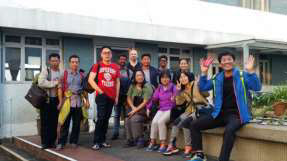 The purpose of this section is to help the participants evolve a theological basis for their involvement in the Mission of YMCA. Biblical faith interacting with contemporary challenges should provide a framework for this. Our commitment to serve all God’s people and God’s creation in their struggle for new life is the starting point for our Theological reflection. To discern God’s presence in the socio-political and religious-cultural realities of our time especially people’s search for justice and life, is the core of our faith and spirituality. Theological reflection is not a detached academic exercise, but a committed engagement of faith with the realities surrounding us.
The purpose of this section is to help the participants evolve a theological basis for their involvement in the Mission of YMCA. Biblical faith interacting with contemporary challenges should provide a framework for this. Our commitment to serve all God’s people and God’s creation in their struggle for new life is the starting point for our Theological reflection. To discern God’s presence in the socio-political and religious-cultural realities of our time especially people’s search for justice and life, is the core of our faith and spirituality. Theological reflection is not a detached academic exercise, but a committed engagement of faith with the realities surrounding us.
Mission in Context ~ Interpreting Paris Basis and Challenge 21
In order to carry out the contemporary mission of the YMCA, participants will review the interpreting of the Paris Basis (and Kampala Principles) in the Challenge 21. This part of the study will review the YMCA Mission and Social Relevance in the 21st Century. It is expected that participants will have thorough understanding of:
• The Beginnings of the YMCA
• The Paris Basis and Its Interpretation the Kampala Principles
• The History and Development of the Local and National YMCA and their Mission
The participants will study and review the “Statement of Mission” of the Asia and Pacific Alliance, and Challenge 21 of the World Alliance. Particular attention will be paid to the thrusts of the YMCA Mission in the region and also in the world movement. The deliberations will be crucial in changing perceptions and perspectives on Mission and Social Relevance ~ how can the learning be applied in participants’ own context.
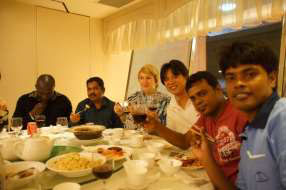
Youth Focus
Our vision is for a YMCA in which young people are at the core of our Movement. We have a calling to be pioneers in bringing about positive change and to create a youth movement that is spiritually strong and socially relevant.
Module III: Contextual Social Issues
a. In-depth Study and Analysis of contextual realities and the impact of globalisation in relation to Regional/Global Realities
b. Gender Sensitivity
c. Interfaith Dialogue
d. Peace Building & Conflict Resolution
Study and Analysis of Contextual Realities, the Impact of Globalization in Relation to Regional/Global Realities/Context
Overview and broad analysis of Contextual Realities of the Globalized Environment
This study will provide an overview and analysis of contextual and global socio-political, cultural, and economic realities/trends and the process of globalization currently taking place.
Analytical Framework of globalization and globalization-related institutions
The participants will discuss how globalization and institutions such as WTO, IMF and World Bank impact on people, particularly in the Asia and Pacific.
• Globalization as a Process and as a Project
• Bretton Woods Institutions: World Bank, IMF, etc., and others, e.g. World Trade Organization, EU, APEC, NAFTA; Transnational Corporations (TNCs)
• UN and related International Organizations
Effects/Impact of Globalization on Life
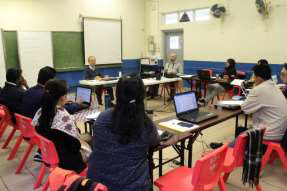
Focus will be given specifically to the consequences of globalization on life, relationships of peoples and to community building.
• Agriculture and Food ~ Sovereignty and Security
• Industrialization and Urbanization
• Environment and Development ~ Sustainability
• Globalization and Culture, Ethics and Religion
Economic Justice
The unjust economic system of the world is making rich getting richer and the poor getting poorer. Unemployment, underemployment, unsafe jobs are the result of unjust economic system. This system increases poverty and substandard living standards. Majority of the earth’s population is living in abject poverty; do not have access to health facilities, education, water & sanitation and also good habitat. These are the issues of economic justice. The participants shall be sharing their experiences in the unjust economic practices and also devote themselves to find alternatives to these existing systems.
Specific Concern on Understanding Gender/Awareness and Sensitivity – our emphasis on participation and leadership development for mission and promotion of gender equity in the YMCA as the Challenge 21 states “especially with those oppressed and discriminated against on the basis of gender”.
Just Peace
Without peace, can there be justice ? Without justice, can there be peace ? Quite often we compromise with justice for peace or with peace for justice. “justice and peace shall embrace” (Ps 85:10). We efforts should be to work towards attaining peace and justice together. They are complimentary to each other. This is the holistic approach to have a meaningful peace and harmony in our society. The participants shall be in the pursuit of search effective ways and means to establish Just Peace in our community.
During this period, relevant case studies, film showing on focus issues and/or documentaries, workshops and/or work group sessions will be conducted on the different components.
Module IV: Youth Leadership and Empowerment
a. Perspective of Global Citizenship
b. Understanding Community and Vision of Alternative Responses
c. Social Economy
Global Citizenship
We define Global Citizenship as an awareness and act of commitment rooted in the spirit of global consciousness and interconnectedness of the world. It recognizes the need to understand global realities and social responsibilities and motivates the people to develop mindset as citizens of the world with human and ethical values. It promotes the collective community social responsibilities and actions towards justice, peace and sustainability of life by citizens as change agents.
Participants will have opportunity to explore YMCA approach to global citizenship towards building more responsible communities; transforming individual lives with a sense of universal equality and care for human beings and the earth in its entirety.
The Vision of Alternative Responses
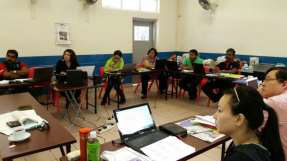
The participants will have opportunity to explore alternatives to the process of globalization and its impact, paying attention to:
• Principles, Values and Strategies of Alternative Responses and Social Movements in which mobilization and strengthening of the community (among them grassroots participatory democracy in a local autonomy) the voluntary sector, and, the creation and/or participation in networks will feature including present trends and goals of the Civil Society movements.
• Responding to Other Faiths in dialogue, cooperation and partnership. Concrete examples will be studied on processes that are able to transform life and society.
• YMCA as a social service organization – its relationship with various types of people’s organizations and other social movements
YMCA as a Movement in sustainable Community Building and becoming more involved in Civil Society - especially in the areas of advocacy, lobbying, empowerment through education and awareness building, networking and the development of other rights-based initiatives that address the issues of youth, women, the poor and the marginalized.
Social Economy
Social Economy is considered as an alternative economic system when the market economy has totally failed to bring economic emancipation for the people in modern days. The outcome from the Bretton Wood Institutions formed in the last century after the WW2 never brought good news for the mass people of the countries of the South. The market economy dwelt on the values of profitability only, made the world divided between the rich and the poor and the gap ever widening.
In such a situation social economy evolved as an alternative way to nurture the economy, based the values of cooperation, mutual respect, social entrepreneurship and social welfare. The social economy, is termed as ‘third sector’ and ‘non-profit sector’, refers to the various organizations between the state and the market, fulfilling both economic and social welfare objectives.
Common Characteristics of Social Enterprises is that they promote solidarity and mutuality. These enterprises are established to serve a common need, run by consumers themselves, not for profit but for providing better products and service at the most reasonable cost. The profits are re-invested for greater interest of the stake holders. The emergence of social enterprises has created space for social leadership and volunteerism.
There is an ample scope for the YMCAs to get more involved in social enterprises for the economic emancipation of the people. The necessity of responding to the economic needs of the people is important for the well-being of the people. Keeping these in mind, the APAY have incorporated Social Economy as a component of the Advanced Studies Program with the following objectives:
• To enhance knowledge of Social Economy amongst the participants.
• To learn about the best practices in Social Economy and also other NGOs leading in this field.
• To examine the possibility of YMCAs increased involvement in Social Economy.
Alternative Tourism
Alternative Tourism involves travel that is personal and authentic and encourages interaction with the local environment, people and communities.
Alternative Tourism gives emphasis to the contact and understanding between the hosts and the tourists, as well as the environment. Also as a tourism that is consistent with the natural, social and community values and that allows a positive relationship among locals and tourists. It has smaller impacts in the natural and social environments, links with other sectors like the agriculture and handicraft sectors, promotes local economy and retention of the earnings in the region.
Youth in the YMCA
Historically the YMCA is a Youth Focused Organization. YMCA has always been in the pursuit for the Youth Development, creating space for them in the YMCA for leadership development. Uni-Ys are the platforms, within the YMCA to give them such opportunity to develop themselves.
YMCA struggles to bring about a positive change in our lives, in our communities. This is only possible if the youth devote themselves in our struggle and we harness their power in all our development efforts. Our vision is for a YMCA in which young people are at the core of our Movement. We have a calling to be pioneers in creating a youth movement that is spiritually strong and socially relevant.
Module V: Movement Strengthening
a. Movement Strengthening Matrix
b. Organizational Review
c. SWOT Analysis
d. Strategic Planning Process
e. Lay Leadership Development
f. Good Governance in the YMCA
Movement Strengthening (MS)
What is a strong movement? The Advanced Studies emphasizes the formation of YMCA professional leaders for the strengthening and growth of the YMCA – in Mission Clarity, Social Relevance and Institutional Viability. (Movement Strengthening Matrix)
We have a common mission to share the reign (love of God) in our diverse social, cultural and political realities in our respective contexts. The participants will be engaged in a study of YMCA governance structures and relationships at different levels, membership concept and composition, and the role of the membership and volunteers in the contextual mission of the YMCA.
Organizational Review
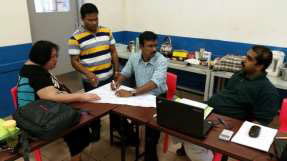 Critical study to access the state of affairs of a YMCA falls under the Organizational Review process. A YMCA Secretary should be able to identify the situation of its own YMCA, undergo the process of determining the Strengths, Weaknesses, Opportunities & Threats (SWOT Analysis) of the YMCA and taken these aspects into account, should be able to prepare the Strategic Plan for his own YMCA for its subsequent implementation, so that the YMCA can set foot on its right path towards achieving its mission.
Critical study to access the state of affairs of a YMCA falls under the Organizational Review process. A YMCA Secretary should be able to identify the situation of its own YMCA, undergo the process of determining the Strengths, Weaknesses, Opportunities & Threats (SWOT Analysis) of the YMCA and taken these aspects into account, should be able to prepare the Strategic Plan for his own YMCA for its subsequent implementation, so that the YMCA can set foot on its right path towards achieving its mission.
The participants shall be helped to undergo the organizational review of their own organization and learn the skills of developing strategic planning.
Strategic Planning
Strategic planning is an organizational management activity that is used to set priorities, focus energy and resources, strengthen operations, ensure that employees and other stakeholders are working toward common goals, establish agreement around intended outcomes/results, and assess and adjust the organization's direction in response to a changing environment. It is a disciplined effort that produces fundamental decisions and actions that shape and guide what an organization is, who it serves, what it does, and why it does it, with a focus on the future. Effective strategic planning articulates not only where an organization is going and the actions needed to make progress, but also how it will know if it is successful.
Lay Leadership Development
The participants shall be made acquainted with the aspect of Lay Leadership Development. The YMCA being the largest membership based organization; the focus of the YMCA has always been its members. Lay Leadership Development is the prerequisite for appropriate leadership of the YMCA to fulfill its mission in the community.

Good Governance
Upholding the practice of Good Governance in the YMCA is imperative in order to be transparent and accountable to the constituency and stakeholders. To have a clear understanding about the constitution and ensure its adherence and good practice in the organization is the primary focus of the good governance.
Module VI: Contextual Programme Response
a. Presentation and Discussion on Program Response
b. Submission of Program Response
c. Create Concept Note & Proposal Writing
Contextual Programme Response: Re-Entry Plan
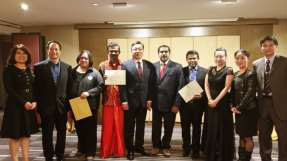
Participants are expected to prepare a program response or Re-Entry Plan during the end of the programme. The written Programme Responses shall be presented at Plenary Sessions, to be attended by all participants, APAY staff and other invitees. This is for sharing of ideas and for feedback with a view to making the plans realistic and achievable. After incorporating all comments and suggestions, a final draft shall be submitted to the Asia and Pacific Alliance of YMCAs. The programme response is expected to be innovative, contextual and reflective of the needs of the community where he/she serves.
Module VII: Evaluation & Graduation
a. Evaluation
b. Graduation Ceremony
An ongoing process shall be in place to assess the participants’ performance. The final evaluation shall take place at the end of the program. The Graduation Ceremony shall take place at the end of the program, where the participants shall commit themselves with their re-entry plan in their YMCA. Course Attendance Certificate shall be distributed to the participants at the ceremony in the presence of the YMCA dignitaries.
OTHER INFORMATION
Date
The 35th Advanced Studies program shall commence from morning of Friday, 3rd of November and conclude on Tuesday 28th November 2017.
The participants are advised to arrive Hong Kong before or on the evening of Thursday, 2nd of November 2017 and plan to depart Hong Kong on Wedneday, 29th of November, 2017.
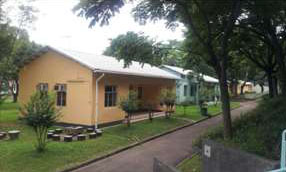
Bible Sharing
Everyday Bible Sharing in the morning for half an hour will be part of the daily community life during the Advanced Studies Programme. These will be organized by the participants themselves in a creative way, guided by resource persons on this field.
Resource Persons
Selected persons with relevant experience, widely recognized for their outstanding contributions in the various components of the Advanced Studies, will be invited to serve as Resource Persons.
Classes
Regular classes will be held throughout the programme. There will be seminars and workgroup sessions on specific topics. Participants will have scope to meet the resource persons individually to clarify concepts and issues, and relate the study to his/her own social situations. Usually classes are held daily from 8.30 am to 5.00 pm with tea breaks and lunch breaks in between.
Sundays
All Sundays are kept aside free for the participants during the training period, They may partake in devotions according to their choice in places of worship in Hong Kong .
Accommodation
Participants will stay at the YMCA Wu Kwai Sha Youth Village, Hong Kong. They will be accommodated in twin-shared rooms in a four roomed cottage. Each cottage will have a kitchenette with basic utensils. Rooming arrangements will be made by the Asia and Pacific Alliance of YMCAs.
Dressing, Personal Toiletries and Laundry
Dressing can generally be casual. Smart casual/formal or national dressing will be expected at some functions, e.g. at Official Opening and Graduation function. The weather is generally cool in November and temperatures may range between 16-20 degrees Celsius.
Participants are expected to bring personal toiletries, including bath towels. Bed linen and blankets will be provided. Coin-operated washing and drying machines are available.
Daily Time-Table
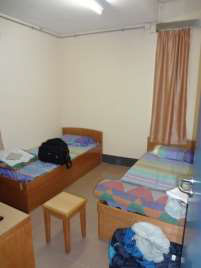
07:45 – 08:30 Breakfast
08:30 – 09:00 Morning Devotion
09:00 – 10:30 Session 1
10:30 – 10:45 Break
10:45 – 12:00 Session 2
12:00 – 12:45 Lunch
12:45 – 13:30 Rest
13:30 – 15:00 Session 3
15:00 – 15:15 Break
15:15 – 17:00 Session 4
17:00 – 18:00 Free time
18:00 – 18:45 Dinner
APPLICATION, SELECTION PROCESS and PREPARATIONS
Please read carefully and note the requirements for application and selection. It is crucial that deadlines for the processes are met to ensure the smooth implementation of the 35th Advanced Studies Programme.
The Applicant is REQUIRED to WRITE and SUBMIT TOGETHER WITH APPLICATION FORM (These will be considered in the final selection of participants)
1. Applicant’s Summary of Self
a. Tell us about some of your past experiences in the YMCA you have served with. What was a key Learning from that position?
b. Tell us more about your present experience. Current position and role, how many people do you lead? What are your challenges and what would you like to develop about yourself to be a more effective leader?
c. What are your Future Aspirations?
What are some of your objectives and what are the outcomes that you would like to see as a result of attending the ASP.
2. A Paper on “Your YMCA’s Mission and How it is Being Expressed in Contemporary Thrusts” (such as key programme that reflects the YMCA Mission that the Applicant has implemented or that the YMCA has been engaged in. This should be between ONE to TWO A-4 sized-pages (single line spacing).
Completed Application Forms duly endorsed by the National Council of YMCAs together with the required papers, and the following:
(i) Two Passport-size Photographs
(ii) Photocopy of pages of the candidate’s passport showing personal details, date of issue and expiry, travel restrictions, etc.
(iii) A document certifying employment in the YMCA, length of employment, and a letter of guarantee that the participant will return to his employment upon completion of the Studies,
(iv) Certified copies of Academic Degrees/Certificates, with translation in English if the original is in the national language of the country of the participant
Applications should reach the Asia and Pacific Alliance office in Hong Kong by 31st July 2017.
An application is deemed complete only when all required documents are received.
SUBMISSION OF THE APPLICATION CANNOT BE TAKEN AS ACCEPTANCE
Selection of Participants
The final selection of participants will be made by the Asia and Pacific Alliance of YMCAs. The selected participants will be informed on or before 15th August 2017. The visa applications of the selected candidates must reach the APAY Office in Hong Kong within 25th August 2017. APAY ashall arrange for training visas for the participants. Please note that it takes more than 6 weeks to process a Hong Kong Visa.
Course Fees/Expenses
The total Course Fees per participant is US$2,115.00
a. Registration Fee: US$ 350 (Mandatory)
b. Course Fee : US$ 1,750 (Covers board and lodging, programme costs in HK)
c. Green Fund : US$ 15 (Mandatory)
Course fees can be sent to the following bank account.
A/C: 015-515-20-05004-5
Asia & Pacific Alliance of YMCAs
Bank of East Asia
Swift Code: BEASHKHH
Address: No. 638 Nathan Road, Mongkok, Kowloon, Hong Kong
The sending YMCA will be responsible for the cost of the Return Travel from home YMCA to Hong Kong, and any other domestic travel-related expenses in the home country or in Hong Kong that may be incurred, before or after the duration of the Course
Scholarships
A limited number of partial or full scholarships for the Course Fee of US$1,750 and cost of the return travel will be available to deserving applicants from national movements facing serious financial constraints.
A written application for a partial or full scholarship, stating the scholarship requested for Participation Fee and for Air Travel, by the candidate herself/himself, should accompany the application form. Only candidates who meet the criteria mentioned above should apply. The Scholarship Application should be endorsed and recommended by the National General Secretary.
The awardees will be selected based on MERIT and POTENTIAL for development as a professional secretary within the movement. Please note that an application submitted DOES NOT constitute a scholarship being awarded.
The number and quantum of the Scholarships will be determined according to resources available and needs. Successful applicants will be duly notified through the National General Secretary.Certificate
A Certificate of Attendance specifying the number of hours studied under each component of the programme will be awarded to successful participants.
Insurance
Sending YMCAs should provide for Travel and Personal Accident Insurance Cover for their participants if none has been provided as a staff benefit in the normal Terms and Conditions of Employment of the local or national YMCA. Please ensure that the insurance covers overseas travelling, medical and personal accidents.
Further details or if you need any clarifications please contact :
Duncan Chowdhury
Executive Secretary for Programmes
Asia and Pacific Alliance of YMCAs
23, Waterloo Road, 6th Floor,
Kowloon, Hong Kong SAR
This e-mail address is being protected from spambots. You need JavaScript enabled to view it
Tel. 852-27808347, 27703168 , 2783 3058;
Fax.852- 23854692
